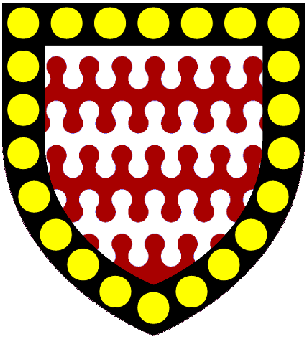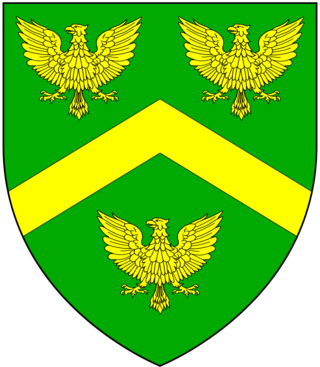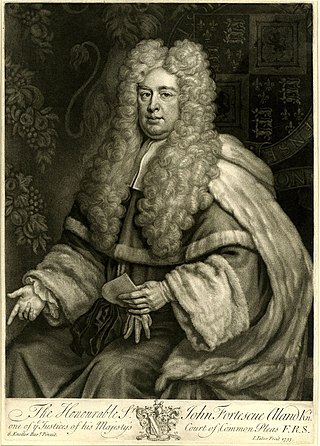Related Research Articles

Sir John Fortescue, of Ebrington in Gloucestershire, was Chief Justice of the King's Bench and was the author of De Laudibus Legum Angliae, first published posthumously circa 1543, an influential treatise on English law. In the course of Henry VI's reign, Fortescue was appointed one of the governors of Lincoln's Inn three times and served as a Member of Parliament from 1421 to 1437. He became one of the King's Serjeants during the Easter term of 1441, and subsequently served as Chief Justice of the King's Bench from 25 January 1442 to Easter term 1460.

Sir Edward Montagu of Boughton, Hanging Houghton and Hemington in Northamptonshire was an English lawyer and judge in the time of Henry VIII and Edward VI. He was Chief Justice of the King's Bench from 1539 to 1545 and Chief Justice of the Common Pleas from 1545 to 1553.
Alexander Plunket was an Irish statesman and judge of the fifteenth century.

Rowland FitzEustace, 1st Baron Portlester was an Irish peer, statesman and judge. He was one of the dominant political figures in late fifteenth-century Ireland, rivalled in influence probably only by his son-in-law Garret FitzGerald, the "Great" Earl of Kildare.

Sir William de Shareshull KB (1289/1290–1370) was an English lawyer and Chief Justice of the King's Bench from 26 October 1350 to 5 July 1361. He achieved prominence under the administration of Edward III of England.

Sir Thomas Richardson of Honingham in Norfolk, was an English judge and politician who sat in the House of Commons from 1621 to 1622. He was Speaker of the House of Commons for this parliament. He was later Chief Justice of the Common Pleas and Chief Justice of the King's Bench.

Sir John Fineux was an English judge and Chief Justice of the King's Bench.
Sir Thomas Billing was an English judge and Chief Justice of the King's Bench.
Sir Robert Catlyn was an English judge and Chief Justice of the Queen's Bench. He should not be confused with his cousin Richard Catlyn, a politician, who died in 1556.
Sir Edward Saunders was an English judge and Chief Justice of the Queen's Bench.

Sir Adrian Fortescue was a courtier at the court of King Henry VIII of England and member of the Third Order of Saint Dominic who was executed in 1539 and later beatified as a Roman Catholic martyr.

John Fortescue Aland, 1st Baron Fortescue of Credan, of Stapleford Abbotts, Essex, was an English lawyer, judge and politician who sat in the House of Commons for two years from 1715 to 1717. He wrote on English legal and constitutional history, and was said to have influenced Thomas Jefferson. A member of both the Middle Temple and Inner Temple, he became a King's Counsel in 1714 and was then appointed Solicitor General, first to the Prince of Wales and then to his father George I in 1715. After a short stint as a Member of Parliament, Fortescue Aland was knighted and elevated to the Bench as a Baron of the Exchequer in 1717. He was subsequently a justice of the Court of King's Bench (1718–1727) and of the Court of Common Pleas (1728–1746), save for a brief hiatus between 1727 and 1728 which has been attributed to George II's displeasure with one of his legal opinions.
Sir Richard Bolton was an English lawyer and judge, who was an important figure in Irish political life in the 1630s and 1640s.
Sir William Yelverton KB was a judge in Norfolk, England and twice a member of parliament for Great Yarmouth, Norfolk.
Thomas Dongan (c.1590–1663) was an Irish judge of the seventeenth century. His career was dogged by accusations of recusancy and of disloyalty to the English Crown. He is chiefly remembered as the father of Margaret Dongan, wife of the Dutch scholar Arnold Boate, who commemorated her lovingly in his book The Character of a Truly Virtuous and Pious Woman, and also wrote with affection and respect about her father.

Sir Thomas Tuddenham was an influential Norfolk landowner, official and courtier. He served as Steward of the Duchy of Lancaster, and Keeper of the Great Wardrobe. During the Wars of the Roses he allied himself with the Lancastrian side, and after the Yorkist victory in 1461 was charged with treason and beheaded on Tower Hill on 23 February 1462.

William Paston, the only son of Clement Paston and Beatrice Somerton, had a distinguished career as a lawyer and Justice of the Common Pleas. He acquired considerable property, and is considered "the real founder of the Paston family fortunes".
John Paston I was an English country gentleman and landowner. He was the eldest son of the judge William Paston, Justice of the Common Pleas. After he succeeded his father in 1444, his life was marked by conflict occasioned by a power struggle in East Anglia between the dukes of Suffolk and Norfolk, and by his involvement in the affairs of his wife's kinsman, Sir John Fastolf. Between 1460–1466 he was Justice of the Peace for Norfolk, and was elected as a member of parliament in 1460 and again in 1461. A number of his letters survive among the Paston Letters, a rich source of historical information for the lives of the English gentry of the period.
Sir John Paston was the eldest son of John Paston and Margaret Mautby. He succeeded his father in 1466, and spent a considerable part of his life attempting to make good his father's claim to the lands of Margaret Mautby's kinsman, Sir John Fastolf. A number of his letters survive among the Paston Letters, a rich source of historical information for the lives of the English gentry of the period. Although long betrothed to Anne Haute, a first cousin of Elizabeth Woodville, he never married, and was succeeded by his younger brother, also named John.
Sir John Paston, was the second son of John Paston and Margaret Mautby. He succeeded his elder brother, Sir John Paston, in 1479. He fought at Barnet and Stoke with John de Vere, 13th Earl of Oxford, served as his deputy when Oxford was appointed Lord High Admiral of England, and was a member of the Earl's council. A number of his letters survive among the Paston Letters, a rich source of historical information about the lives of the English gentry of the period.
References
- Attribution
![]() This article incorporates text from a publication now in the public domain : "Markham, John (d.1479)". Dictionary of National Biography . London: Smith, Elder & Co. 1885–1900.
This article incorporates text from a publication now in the public domain : "Markham, John (d.1479)". Dictionary of National Biography . London: Smith, Elder & Co. 1885–1900.